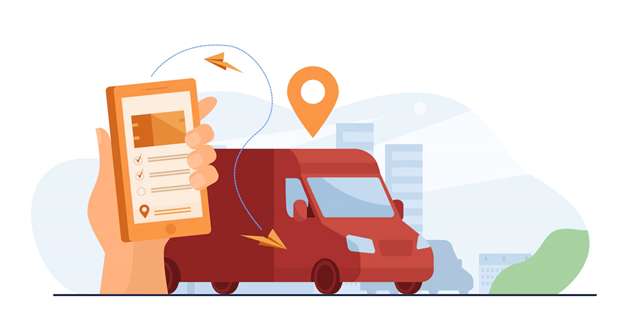How Logistics Apps shape the E-Commerce Experience
The e-commerce landscape is constantly evolving, and logistics apps play a big role in shaping the experience for consumers. By streamlining the shipping and delivery process, these apps make it easy for shoppers to get what they need without any hassle. And as e-commerce continues to grow, logistics apps will become even more important in providing an enjoyable and seamless shopping experience.

What does logistics mean for e-commerce?
In e-commerce, logistics refers to the process of shipping and delivering goods. This includes everything from warehouse management to order fulfillment. Logistics apps streamline this process by providing a simple and efficient way for businesses to manage their shipments. By doing so, they help e-commerce companies save time and money, while also improving the customer experience.
As e-commerce continues to grow, logistics apps will become even more important. With more shoppers turning to online shopping, businesses need to find ways to streamline their shipping and delivery process. Logistics apps provide an easy and efficient way to do this. In addition to improving the customer experience, they can also help businesses save time and money.
Market trends of logistics app development
The logistics app market is constantly evolving in order to meet the needs of e-commerce businesses. In recent years, there has been a shift towards apps that offer more than just shipping and delivery services. These apps are now beginning to incorporate features such as order tracking, customer service, and even payments. This trend is being driven by the need for e-commerce businesses to provide a more comprehensive and seamless shopping experience for their customers.
As the e-commerce landscape continues to grow, so too will the demand for logistics apps. This means that we can expect to see even more innovation in the space, with new features and services being added to meet the needs of businesses and shoppers alike. Here are some of the market trends in the logistics sector.
Integration of Blockchain Technology in eCommerce
The eCommerce industry is rapidly evolving. New technologies are emerging that have the potential to change the way eCommerce businesses operate. One of these new technologies is blockchain.
Blockchain is a decentralized, distributed ledger that records transactions in a secure and tamper-resistant way. This makes it an attractive option for eCommerce businesses that want to create a more secure and efficient way to conduct transactions.
There are many potential benefits of integrating blockchain into eCommerce. For example, blockchain could help eCommerce businesses to:
– Create a more secure environment for transactions
– Reduce fraudulent activities
– Streamline supply chain management
– Improve customer satisfaction
However, blockchain is still a new technology and it will take some time for eCommerce businesses to fully understand and utilize its potential. In the meantime, eCommerce businesses should keep an eye on this emerging technology and be prepared to adopt it when it is ready.
Adoption of Autonomus Vechiles
E-commerce is one of the key areas where autonomous vehicles (AVs) are expected to have a profound impact. A recent study by Boston Consulting Group estimates that AVs could enable e-commerce companies to reduce their last-mile delivery costs by 30–50 percent. In addition, AVs could help e-commerce companies expand their delivery services to new geographic markets and offer same-day or even two-hour delivery windows.
The impact of AVs on e-commerce will not be limited to last-mile delivery, however. In the longer term, e-commerce companies are likely to use AVs for a variety of other purposes, including warehousing and logistics. For instance, Amazon has been experimenting with using drones for last-mile delivery, and it is possible that the company could eventually use AVs for this purpose as well.
The e-commerce sector is just one of many that will be transformed by AV technology. Others include transportation, logistics, automotive manufacturing, and insurance. As AV technology continues to develop, it is likely that we will see even more applications for this transformative technology.
App based on AI
E-commerce is not the only area where AI is having an impact. In fact, AI is being used in a variety of different industries to transform how business is done. One example is the insurance industry, where AI is being used to help underwriters more accurately assess risk. By analyzing data more effectively, AI can help insurers identify potential risks more accurately, which can help them to better price their products and reduce losses.
AI is also being used in the automotive industry to develop autonomous vehicles (AVs). AVs are cars that are able to drive themselves without the need for a human driver. While this technology is still in its early stages, it has the potential to transform the automotive industry, as well as the transportation sector more broadly.
AI is also being used to develop new e-commerce applications. For instance, Amazon’s Echo Look device uses AI to provide fashion advice to users. And Alibaba, the Chinese e-commerce giant, has developed an AI-powered shopping assistant that helps users find products they are interested in.
As AI continues to develop, we are likely to see even more applications for this transformative technology.
Last Mile delivery
Along with growing e-commerce sales, the demand for last-mile delivery services is also rising. This has created an opportunity for companies that can provide these services more effectively and efficiently.

Integration of cloud-based System
E-commerce businesses are increasingly turning to cloud-based systems to power their operations. This is because cloud-based systems offer a number of advantages, such as scalability, flexibility, and cost-effectiveness.
A recent study by Forrester found that 43 percent of e-commerce businesses were using cloud-based solutions in 2017, and this number is expected to grow to 62 percent by 2020.
Some of the most popular cloud-based solutions for e-commerce businesses include customer relationship management (CRM) systems, enterprise resource planning (ERP) systems, and warehouse management systems.
By moving to the cloud, e-commerce businesses can improve their scalability, flexibility, and cost-effectiveness.
If you’re looking to develop an app that can transform your business, contact MVP Developer today. We can help you to create a custom solution that meets your specific needs.
